Mindfulness-Based Cognitive Therapy Implementation Plan Report
VerifiedAdded on 2023/01/18
|8
|1711
|92
Report
AI Summary
This report presents an implementation plan for a mindfulness-based cognitive therapy (MBCT) intervention targeting military veterans at risk of suicide and depression. The plan outlines the setting, a counseling department within a military unit in Florida, and the sample group recruitment process, including ethical considerations such as informed consent. The timeline spans from June to November 2019, detailing stages from research setup to data analysis and presentation. Resource needs include human resources with mental health expertise, screening questionnaires, and the Beck’s Depression Inventory tool for depression assessment. The intervention involves a randomized controlled trial, with one group receiving MBCT and the other receiving treatment as usual. Data collection will utilize the Beck’s Depression Inventory and the Columbia Suicide Severity Rating Scale. Statistical methods will be used for data analysis, and strategies to address potential barriers, such as participant attrition, are included. The plan's feasibility is assessed through a cost analysis of required resources, and plans to maintain the solution post-implementation include participant feedback and continuous evaluation. The references provide evidence for the effectiveness of MBCT in the veteran population.
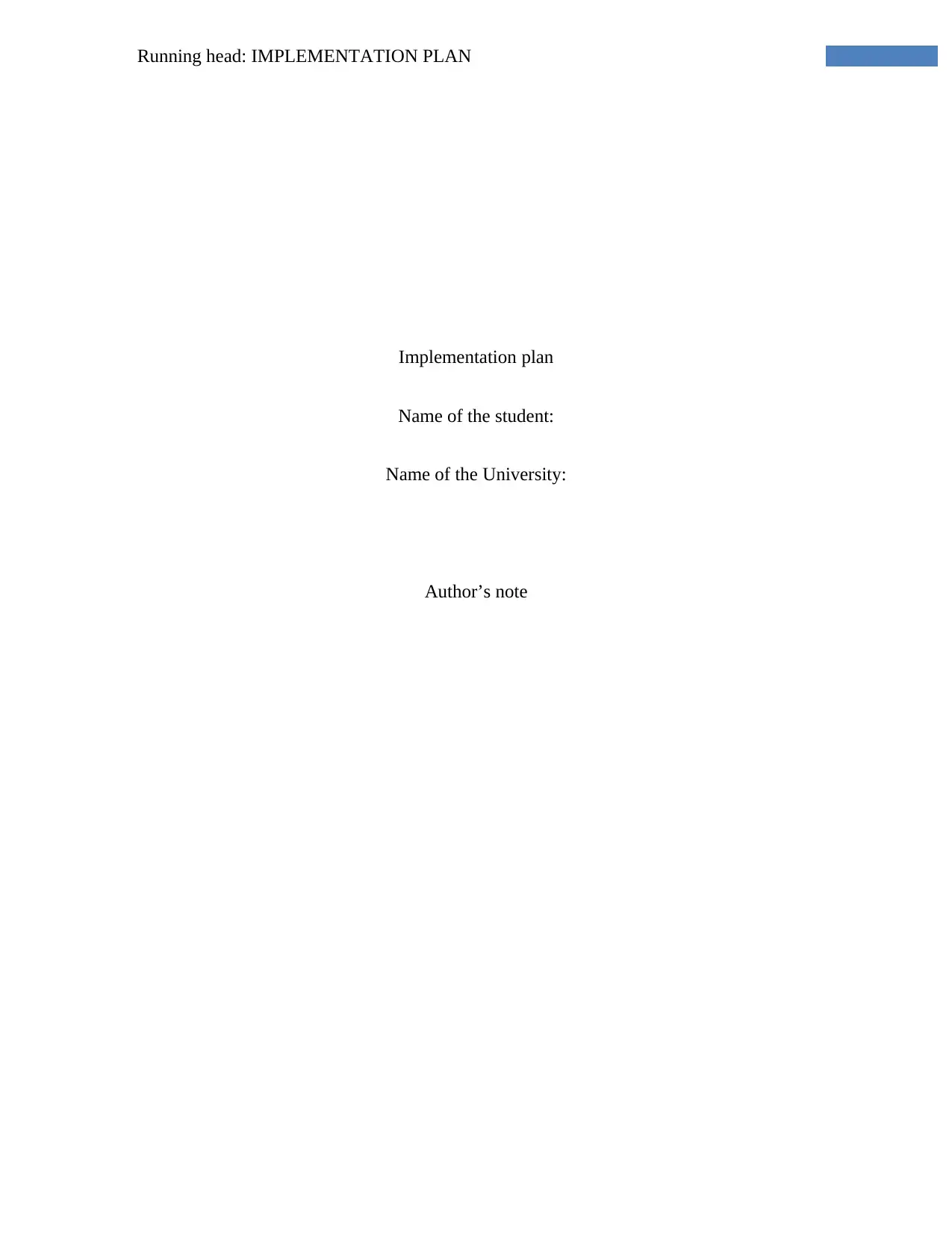
Running head: IMPLEMENTATION PLAN
Implementation plan
Name of the student:
Name of the University:
Author’s note
Implementation plan
Name of the student:
Name of the University:
Author’s note
Paraphrase This Document
Need a fresh take? Get an instant paraphrase of this document with our AI Paraphraser
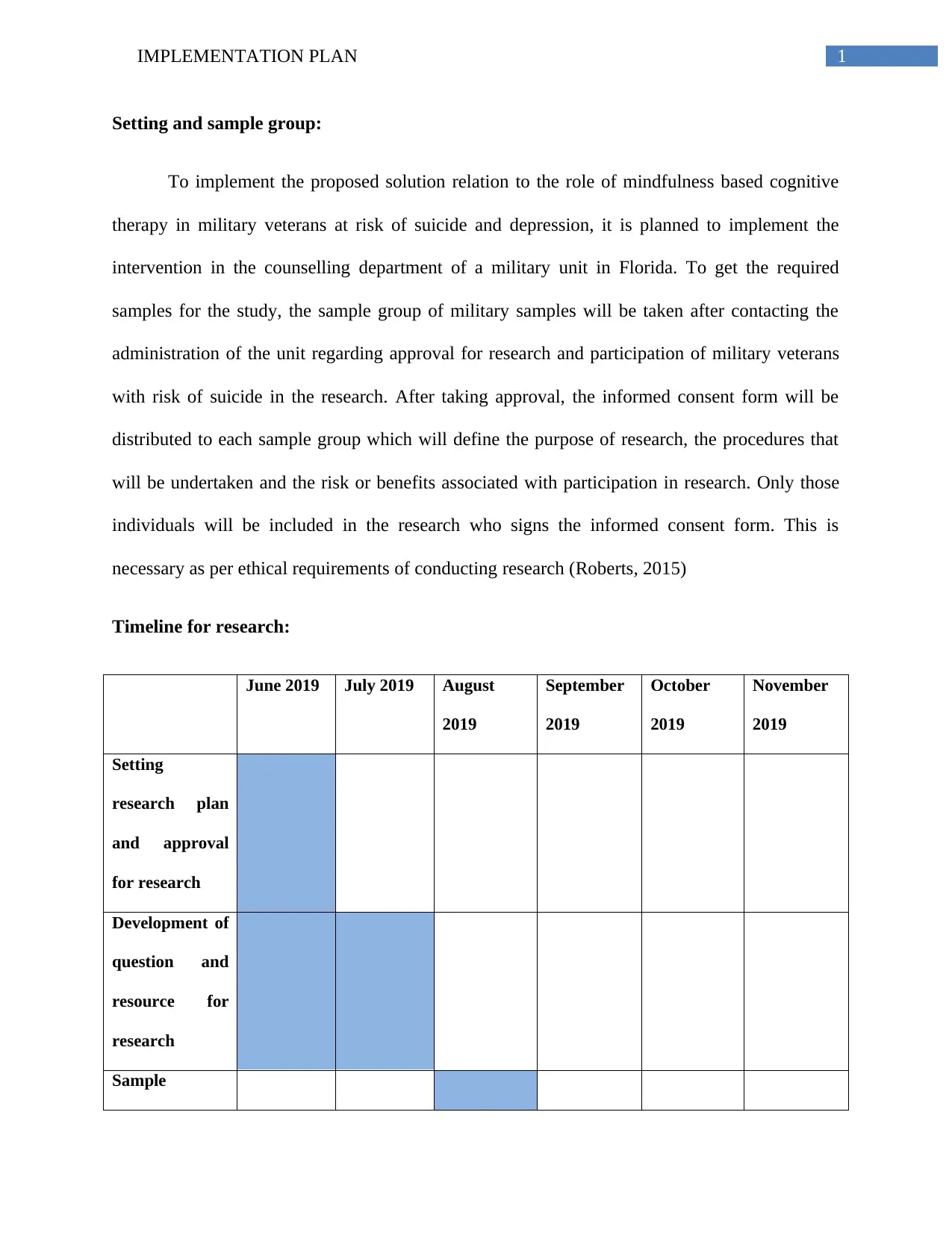
1IMPLEMENTATION PLAN
Setting and sample group:
To implement the proposed solution relation to the role of mindfulness based cognitive
therapy in military veterans at risk of suicide and depression, it is planned to implement the
intervention in the counselling department of a military unit in Florida. To get the required
samples for the study, the sample group of military samples will be taken after contacting the
administration of the unit regarding approval for research and participation of military veterans
with risk of suicide in the research. After taking approval, the informed consent form will be
distributed to each sample group which will define the purpose of research, the procedures that
will be undertaken and the risk or benefits associated with participation in research. Only those
individuals will be included in the research who signs the informed consent form. This is
necessary as per ethical requirements of conducting research (Roberts, 2015)
Timeline for research:
June 2019 July 2019 August
2019
September
2019
October
2019
November
2019
Setting
research plan
and approval
for research
Development of
question and
resource for
research
Sample
Setting and sample group:
To implement the proposed solution relation to the role of mindfulness based cognitive
therapy in military veterans at risk of suicide and depression, it is planned to implement the
intervention in the counselling department of a military unit in Florida. To get the required
samples for the study, the sample group of military samples will be taken after contacting the
administration of the unit regarding approval for research and participation of military veterans
with risk of suicide in the research. After taking approval, the informed consent form will be
distributed to each sample group which will define the purpose of research, the procedures that
will be undertaken and the risk or benefits associated with participation in research. Only those
individuals will be included in the research who signs the informed consent form. This is
necessary as per ethical requirements of conducting research (Roberts, 2015)
Timeline for research:
June 2019 July 2019 August
2019
September
2019
October
2019
November
2019
Setting
research plan
and approval
for research
Development of
question and
resource for
research
Sample
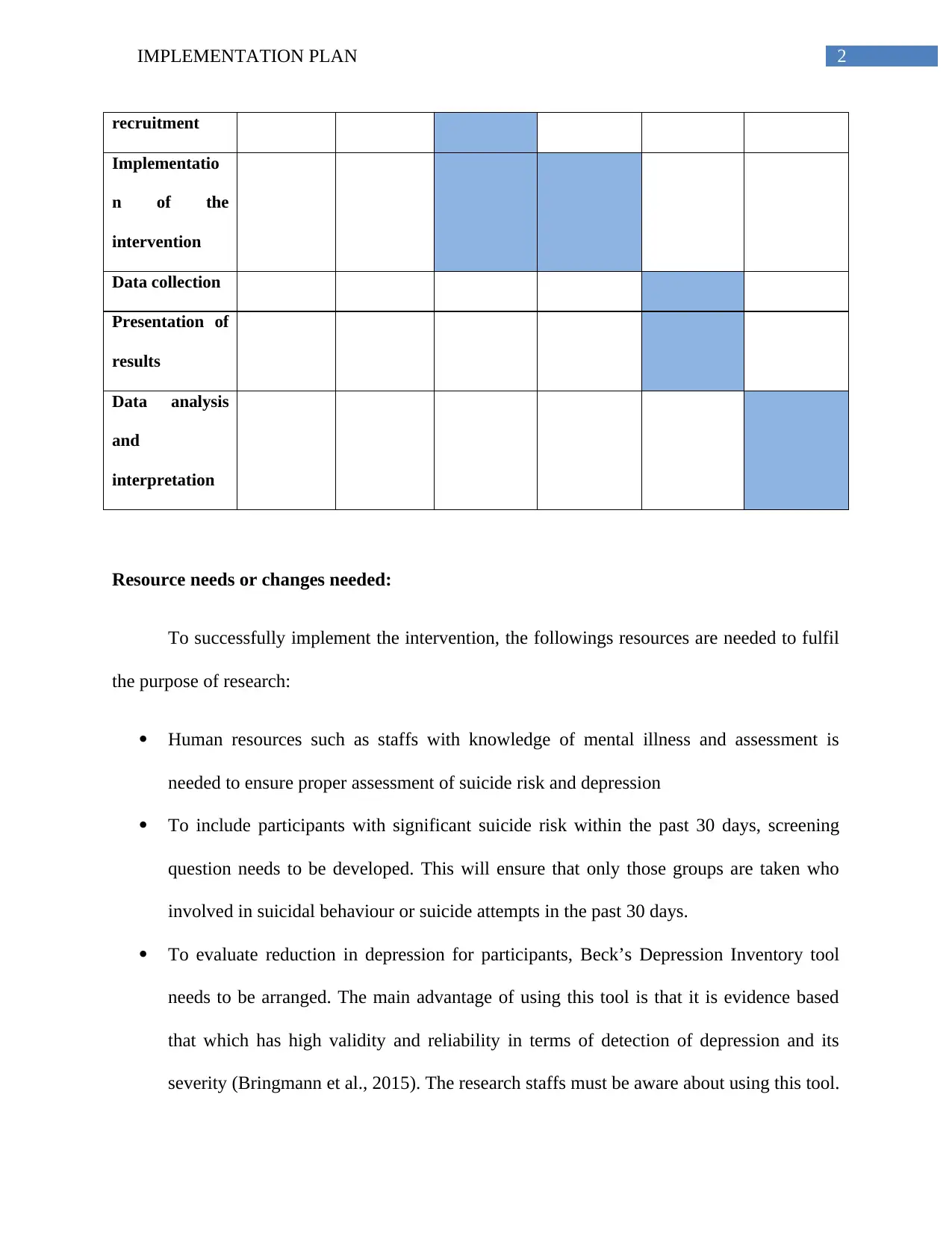
2IMPLEMENTATION PLAN
recruitment
Implementatio
n of the
intervention
Data collection
Presentation of
results
Data analysis
and
interpretation
Resource needs or changes needed:
To successfully implement the intervention, the followings resources are needed to fulfil
the purpose of research:
Human resources such as staffs with knowledge of mental illness and assessment is
needed to ensure proper assessment of suicide risk and depression
To include participants with significant suicide risk within the past 30 days, screening
question needs to be developed. This will ensure that only those groups are taken who
involved in suicidal behaviour or suicide attempts in the past 30 days.
To evaluate reduction in depression for participants, Beck’s Depression Inventory tool
needs to be arranged. The main advantage of using this tool is that it is evidence based
that which has high validity and reliability in terms of detection of depression and its
severity (Bringmann et al., 2015). The research staffs must be aware about using this tool.
recruitment
Implementatio
n of the
intervention
Data collection
Presentation of
results
Data analysis
and
interpretation
Resource needs or changes needed:
To successfully implement the intervention, the followings resources are needed to fulfil
the purpose of research:
Human resources such as staffs with knowledge of mental illness and assessment is
needed to ensure proper assessment of suicide risk and depression
To include participants with significant suicide risk within the past 30 days, screening
question needs to be developed. This will ensure that only those groups are taken who
involved in suicidal behaviour or suicide attempts in the past 30 days.
To evaluate reduction in depression for participants, Beck’s Depression Inventory tool
needs to be arranged. The main advantage of using this tool is that it is evidence based
that which has high validity and reliability in terms of detection of depression and its
severity (Bringmann et al., 2015). The research staffs must be aware about using this tool.
⊘ This is a preview!⊘
Do you want full access?
Subscribe today to unlock all pages.

Trusted by 1+ million students worldwide
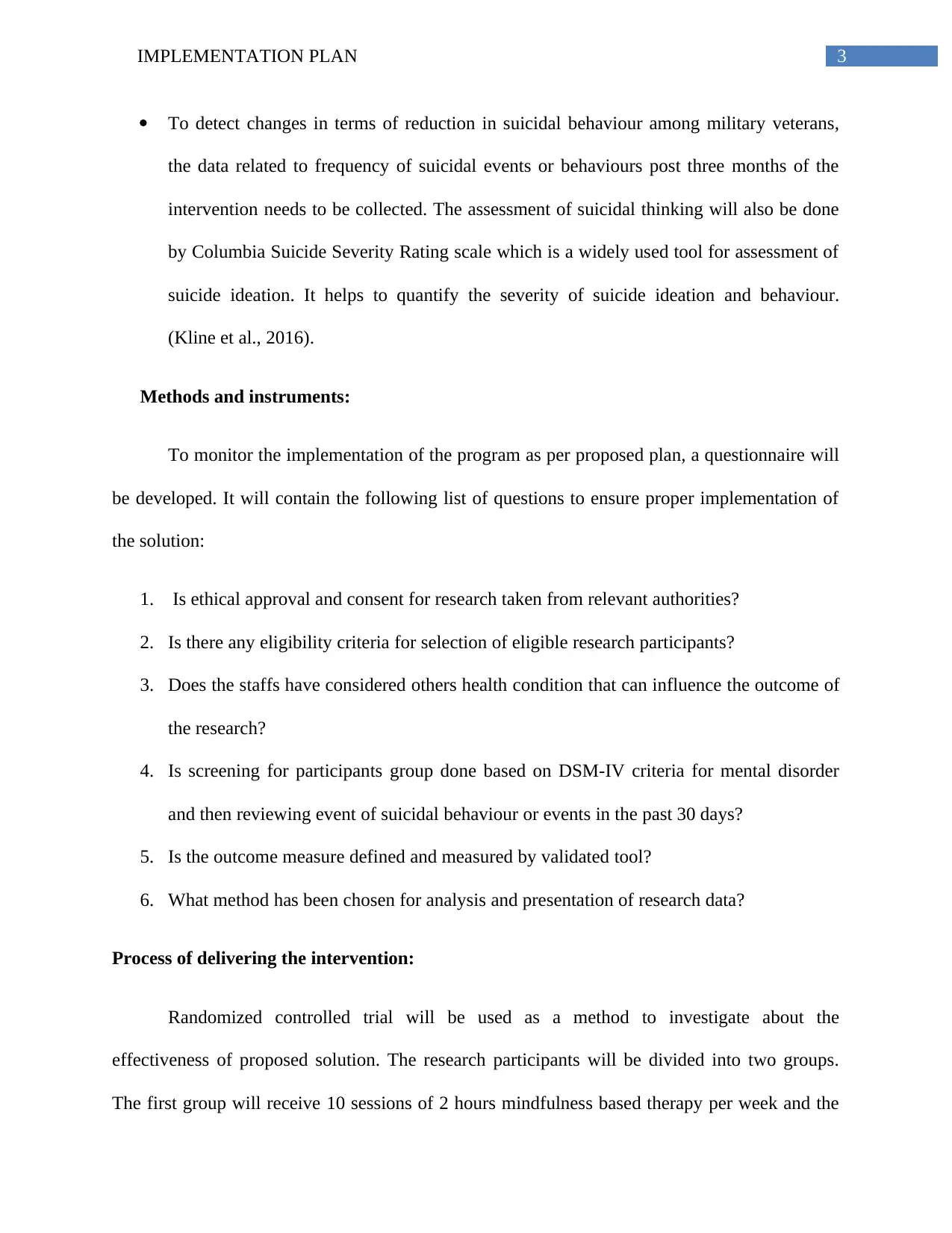
3IMPLEMENTATION PLAN
To detect changes in terms of reduction in suicidal behaviour among military veterans,
the data related to frequency of suicidal events or behaviours post three months of the
intervention needs to be collected. The assessment of suicidal thinking will also be done
by Columbia Suicide Severity Rating scale which is a widely used tool for assessment of
suicide ideation. It helps to quantify the severity of suicide ideation and behaviour.
(Kline et al., 2016).
Methods and instruments:
To monitor the implementation of the program as per proposed plan, a questionnaire will
be developed. It will contain the following list of questions to ensure proper implementation of
the solution:
1. Is ethical approval and consent for research taken from relevant authorities?
2. Is there any eligibility criteria for selection of eligible research participants?
3. Does the staffs have considered others health condition that can influence the outcome of
the research?
4. Is screening for participants group done based on DSM-IV criteria for mental disorder
and then reviewing event of suicidal behaviour or events in the past 30 days?
5. Is the outcome measure defined and measured by validated tool?
6. What method has been chosen for analysis and presentation of research data?
Process of delivering the intervention:
Randomized controlled trial will be used as a method to investigate about the
effectiveness of proposed solution. The research participants will be divided into two groups.
The first group will receive 10 sessions of 2 hours mindfulness based therapy per week and the
To detect changes in terms of reduction in suicidal behaviour among military veterans,
the data related to frequency of suicidal events or behaviours post three months of the
intervention needs to be collected. The assessment of suicidal thinking will also be done
by Columbia Suicide Severity Rating scale which is a widely used tool for assessment of
suicide ideation. It helps to quantify the severity of suicide ideation and behaviour.
(Kline et al., 2016).
Methods and instruments:
To monitor the implementation of the program as per proposed plan, a questionnaire will
be developed. It will contain the following list of questions to ensure proper implementation of
the solution:
1. Is ethical approval and consent for research taken from relevant authorities?
2. Is there any eligibility criteria for selection of eligible research participants?
3. Does the staffs have considered others health condition that can influence the outcome of
the research?
4. Is screening for participants group done based on DSM-IV criteria for mental disorder
and then reviewing event of suicidal behaviour or events in the past 30 days?
5. Is the outcome measure defined and measured by validated tool?
6. What method has been chosen for analysis and presentation of research data?
Process of delivering the intervention:
Randomized controlled trial will be used as a method to investigate about the
effectiveness of proposed solution. The research participants will be divided into two groups.
The first group will receive 10 sessions of 2 hours mindfulness based therapy per week and the
Paraphrase This Document
Need a fresh take? Get an instant paraphrase of this document with our AI Paraphraser
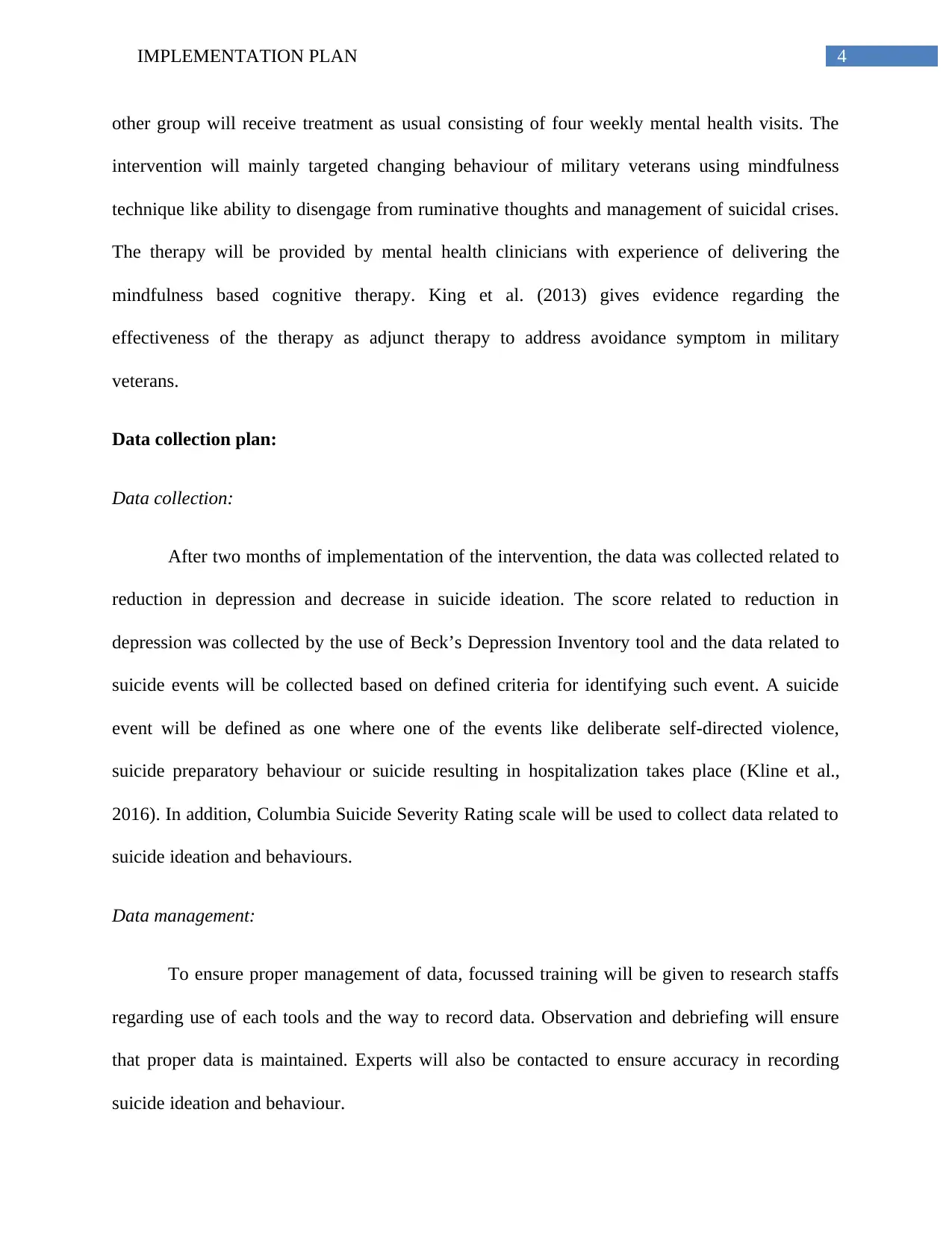
4IMPLEMENTATION PLAN
other group will receive treatment as usual consisting of four weekly mental health visits. The
intervention will mainly targeted changing behaviour of military veterans using mindfulness
technique like ability to disengage from ruminative thoughts and management of suicidal crises.
The therapy will be provided by mental health clinicians with experience of delivering the
mindfulness based cognitive therapy. King et al. (2013) gives evidence regarding the
effectiveness of the therapy as adjunct therapy to address avoidance symptom in military
veterans.
Data collection plan:
Data collection:
After two months of implementation of the intervention, the data was collected related to
reduction in depression and decrease in suicide ideation. The score related to reduction in
depression was collected by the use of Beck’s Depression Inventory tool and the data related to
suicide events will be collected based on defined criteria for identifying such event. A suicide
event will be defined as one where one of the events like deliberate self-directed violence,
suicide preparatory behaviour or suicide resulting in hospitalization takes place (Kline et al.,
2016). In addition, Columbia Suicide Severity Rating scale will be used to collect data related to
suicide ideation and behaviours.
Data management:
To ensure proper management of data, focussed training will be given to research staffs
regarding use of each tools and the way to record data. Observation and debriefing will ensure
that proper data is maintained. Experts will also be contacted to ensure accuracy in recording
suicide ideation and behaviour.
other group will receive treatment as usual consisting of four weekly mental health visits. The
intervention will mainly targeted changing behaviour of military veterans using mindfulness
technique like ability to disengage from ruminative thoughts and management of suicidal crises.
The therapy will be provided by mental health clinicians with experience of delivering the
mindfulness based cognitive therapy. King et al. (2013) gives evidence regarding the
effectiveness of the therapy as adjunct therapy to address avoidance symptom in military
veterans.
Data collection plan:
Data collection:
After two months of implementation of the intervention, the data was collected related to
reduction in depression and decrease in suicide ideation. The score related to reduction in
depression was collected by the use of Beck’s Depression Inventory tool and the data related to
suicide events will be collected based on defined criteria for identifying such event. A suicide
event will be defined as one where one of the events like deliberate self-directed violence,
suicide preparatory behaviour or suicide resulting in hospitalization takes place (Kline et al.,
2016). In addition, Columbia Suicide Severity Rating scale will be used to collect data related to
suicide ideation and behaviours.
Data management:
To ensure proper management of data, focussed training will be given to research staffs
regarding use of each tools and the way to record data. Observation and debriefing will ensure
that proper data is maintained. Experts will also be contacted to ensure accuracy in recording
suicide ideation and behaviour.
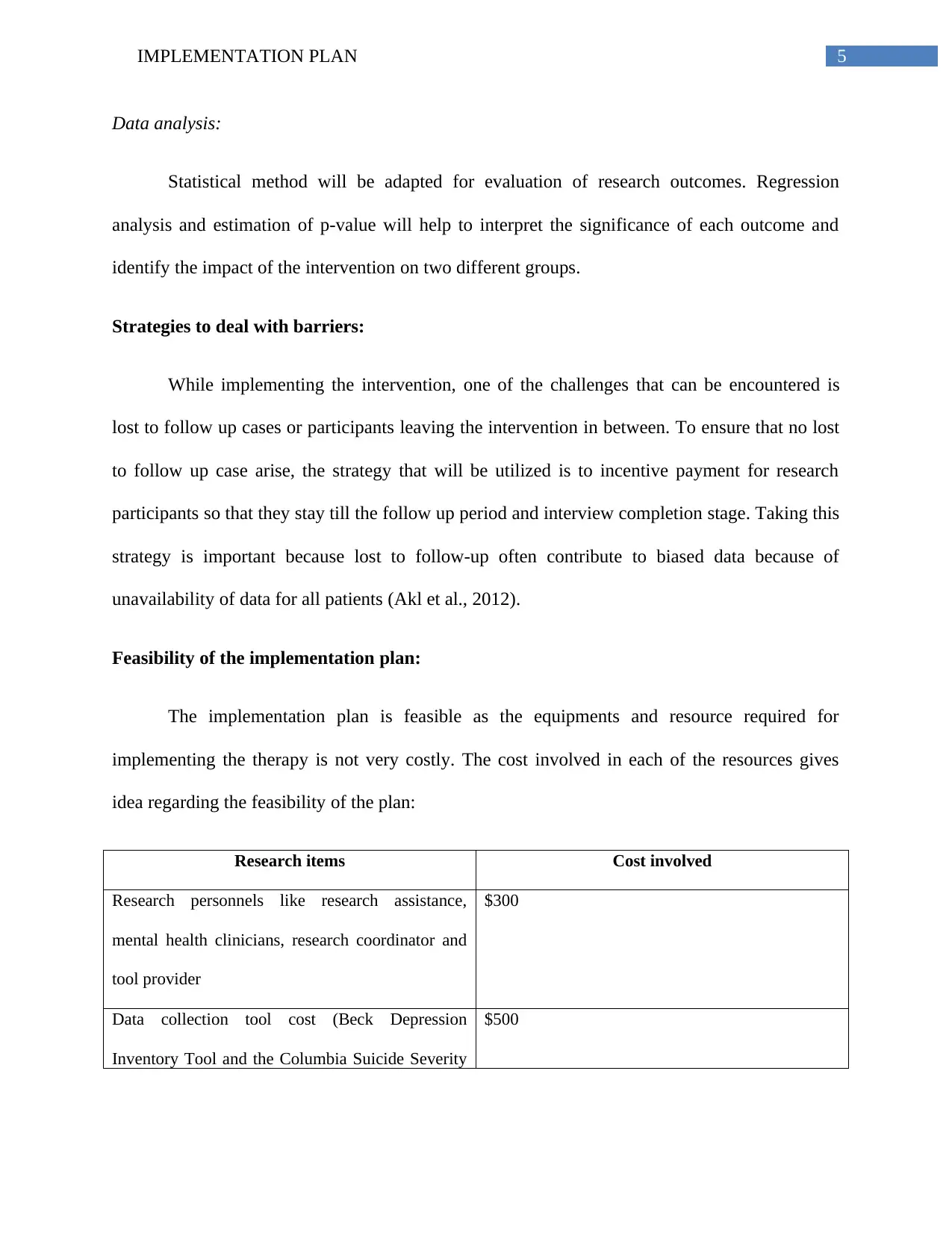
5IMPLEMENTATION PLAN
Data analysis:
Statistical method will be adapted for evaluation of research outcomes. Regression
analysis and estimation of p-value will help to interpret the significance of each outcome and
identify the impact of the intervention on two different groups.
Strategies to deal with barriers:
While implementing the intervention, one of the challenges that can be encountered is
lost to follow up cases or participants leaving the intervention in between. To ensure that no lost
to follow up case arise, the strategy that will be utilized is to incentive payment for research
participants so that they stay till the follow up period and interview completion stage. Taking this
strategy is important because lost to follow-up often contribute to biased data because of
unavailability of data for all patients (Akl et al., 2012).
Feasibility of the implementation plan:
The implementation plan is feasible as the equipments and resource required for
implementing the therapy is not very costly. The cost involved in each of the resources gives
idea regarding the feasibility of the plan:
Research items Cost involved
Research personnels like research assistance,
mental health clinicians, research coordinator and
tool provider
$300
Data collection tool cost (Beck Depression
Inventory Tool and the Columbia Suicide Severity
$500
Data analysis:
Statistical method will be adapted for evaluation of research outcomes. Regression
analysis and estimation of p-value will help to interpret the significance of each outcome and
identify the impact of the intervention on two different groups.
Strategies to deal with barriers:
While implementing the intervention, one of the challenges that can be encountered is
lost to follow up cases or participants leaving the intervention in between. To ensure that no lost
to follow up case arise, the strategy that will be utilized is to incentive payment for research
participants so that they stay till the follow up period and interview completion stage. Taking this
strategy is important because lost to follow-up often contribute to biased data because of
unavailability of data for all patients (Akl et al., 2012).
Feasibility of the implementation plan:
The implementation plan is feasible as the equipments and resource required for
implementing the therapy is not very costly. The cost involved in each of the resources gives
idea regarding the feasibility of the plan:
Research items Cost involved
Research personnels like research assistance,
mental health clinicians, research coordinator and
tool provider
$300
Data collection tool cost (Beck Depression
Inventory Tool and the Columbia Suicide Severity
$500
⊘ This is a preview!⊘
Do you want full access?
Subscribe today to unlock all pages.

Trusted by 1+ million students worldwide
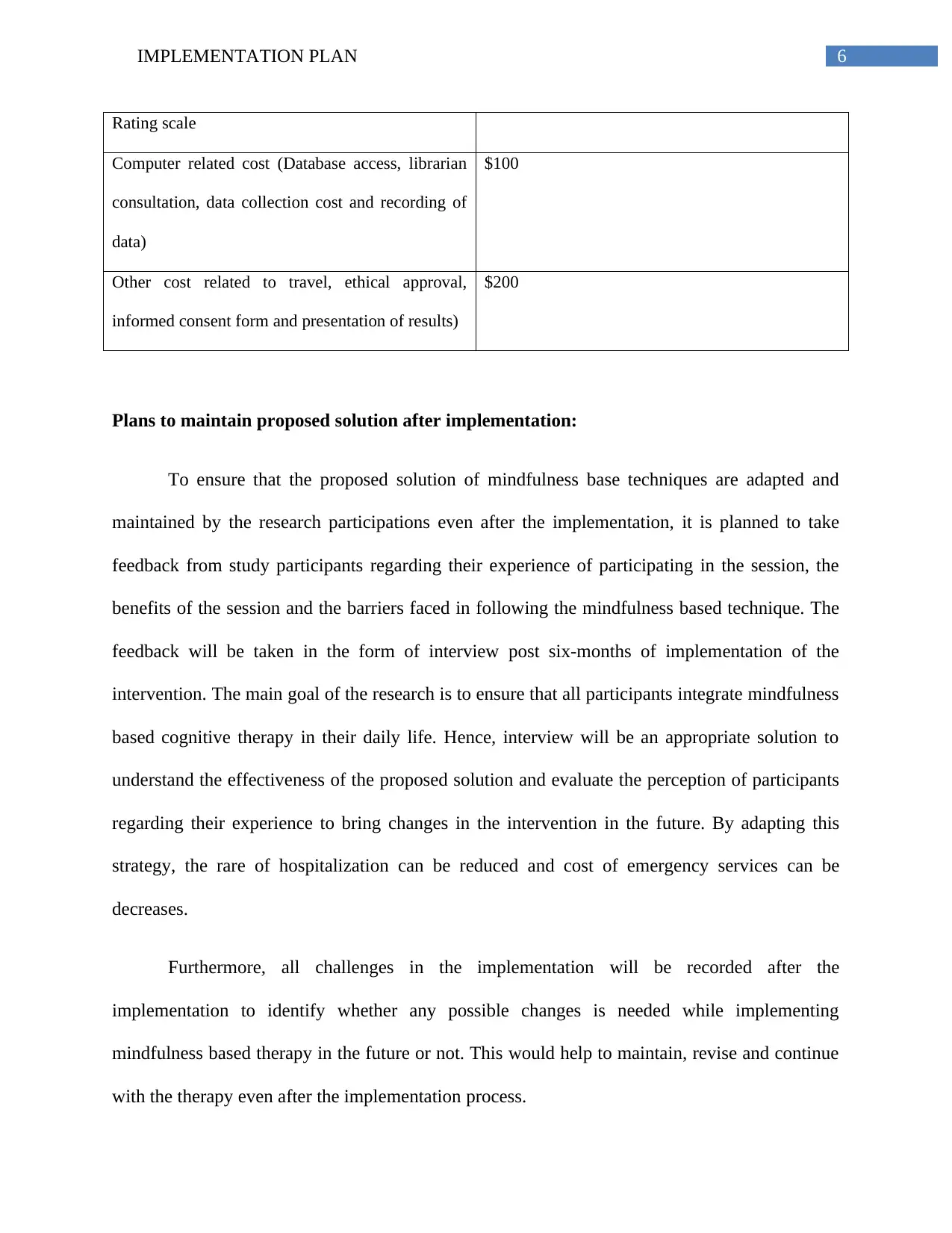
6IMPLEMENTATION PLAN
Rating scale
Computer related cost (Database access, librarian
consultation, data collection cost and recording of
data)
$100
Other cost related to travel, ethical approval,
informed consent form and presentation of results)
$200
Plans to maintain proposed solution after implementation:
To ensure that the proposed solution of mindfulness base techniques are adapted and
maintained by the research participations even after the implementation, it is planned to take
feedback from study participants regarding their experience of participating in the session, the
benefits of the session and the barriers faced in following the mindfulness based technique. The
feedback will be taken in the form of interview post six-months of implementation of the
intervention. The main goal of the research is to ensure that all participants integrate mindfulness
based cognitive therapy in their daily life. Hence, interview will be an appropriate solution to
understand the effectiveness of the proposed solution and evaluate the perception of participants
regarding their experience to bring changes in the intervention in the future. By adapting this
strategy, the rare of hospitalization can be reduced and cost of emergency services can be
decreases.
Furthermore, all challenges in the implementation will be recorded after the
implementation to identify whether any possible changes is needed while implementing
mindfulness based therapy in the future or not. This would help to maintain, revise and continue
with the therapy even after the implementation process.
Rating scale
Computer related cost (Database access, librarian
consultation, data collection cost and recording of
data)
$100
Other cost related to travel, ethical approval,
informed consent form and presentation of results)
$200
Plans to maintain proposed solution after implementation:
To ensure that the proposed solution of mindfulness base techniques are adapted and
maintained by the research participations even after the implementation, it is planned to take
feedback from study participants regarding their experience of participating in the session, the
benefits of the session and the barriers faced in following the mindfulness based technique. The
feedback will be taken in the form of interview post six-months of implementation of the
intervention. The main goal of the research is to ensure that all participants integrate mindfulness
based cognitive therapy in their daily life. Hence, interview will be an appropriate solution to
understand the effectiveness of the proposed solution and evaluate the perception of participants
regarding their experience to bring changes in the intervention in the future. By adapting this
strategy, the rare of hospitalization can be reduced and cost of emergency services can be
decreases.
Furthermore, all challenges in the implementation will be recorded after the
implementation to identify whether any possible changes is needed while implementing
mindfulness based therapy in the future or not. This would help to maintain, revise and continue
with the therapy even after the implementation process.
Paraphrase This Document
Need a fresh take? Get an instant paraphrase of this document with our AI Paraphraser
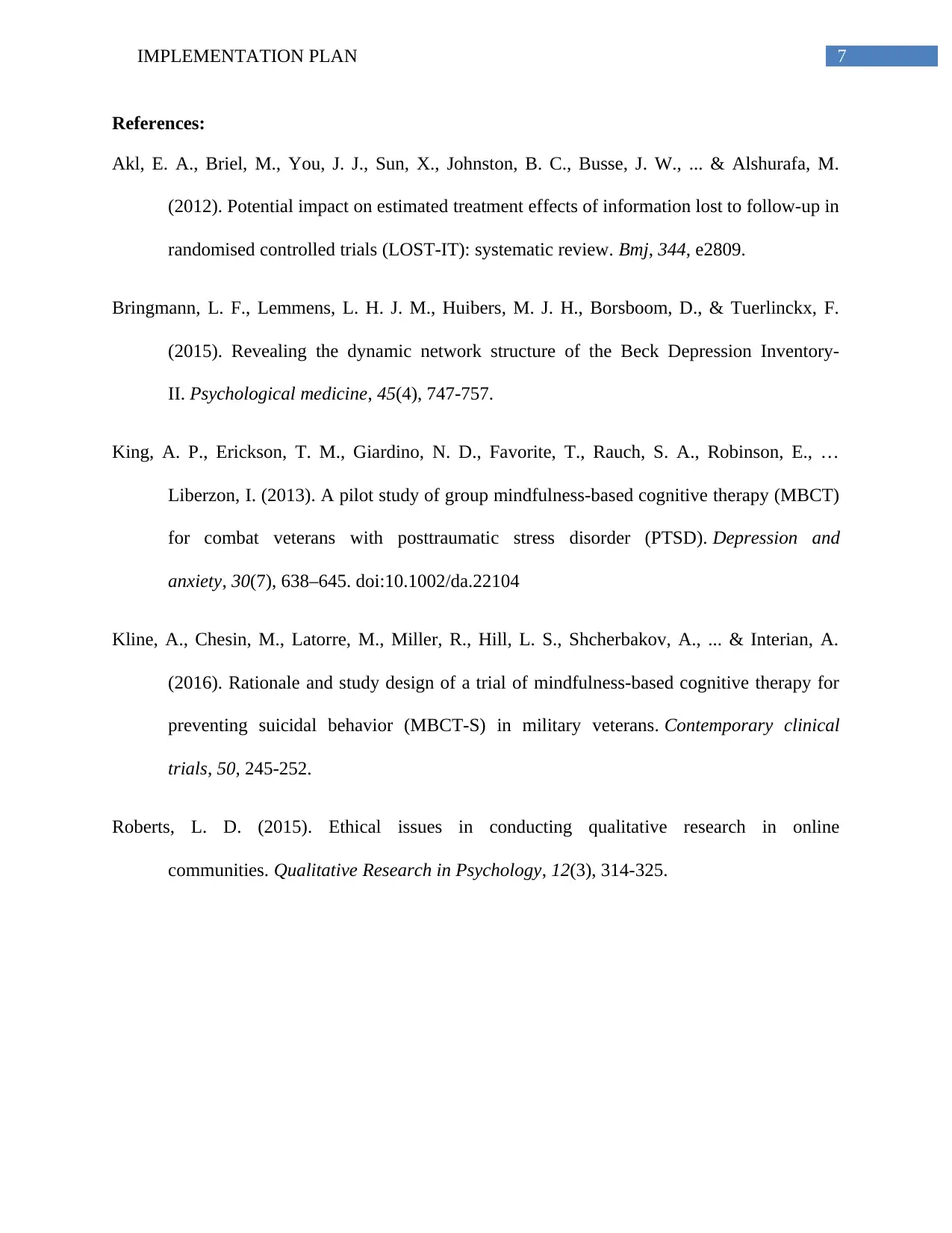
7IMPLEMENTATION PLAN
References:
Akl, E. A., Briel, M., You, J. J., Sun, X., Johnston, B. C., Busse, J. W., ... & Alshurafa, M.
(2012). Potential impact on estimated treatment effects of information lost to follow-up in
randomised controlled trials (LOST-IT): systematic review. Bmj, 344, e2809.
Bringmann, L. F., Lemmens, L. H. J. M., Huibers, M. J. H., Borsboom, D., & Tuerlinckx, F.
(2015). Revealing the dynamic network structure of the Beck Depression Inventory-
II. Psychological medicine, 45(4), 747-757.
King, A. P., Erickson, T. M., Giardino, N. D., Favorite, T., Rauch, S. A., Robinson, E., …
Liberzon, I. (2013). A pilot study of group mindfulness-based cognitive therapy (MBCT)
for combat veterans with posttraumatic stress disorder (PTSD). Depression and
anxiety, 30(7), 638–645. doi:10.1002/da.22104
Kline, A., Chesin, M., Latorre, M., Miller, R., Hill, L. S., Shcherbakov, A., ... & Interian, A.
(2016). Rationale and study design of a trial of mindfulness-based cognitive therapy for
preventing suicidal behavior (MBCT-S) in military veterans. Contemporary clinical
trials, 50, 245-252.
Roberts, L. D. (2015). Ethical issues in conducting qualitative research in online
communities. Qualitative Research in Psychology, 12(3), 314-325.
References:
Akl, E. A., Briel, M., You, J. J., Sun, X., Johnston, B. C., Busse, J. W., ... & Alshurafa, M.
(2012). Potential impact on estimated treatment effects of information lost to follow-up in
randomised controlled trials (LOST-IT): systematic review. Bmj, 344, e2809.
Bringmann, L. F., Lemmens, L. H. J. M., Huibers, M. J. H., Borsboom, D., & Tuerlinckx, F.
(2015). Revealing the dynamic network structure of the Beck Depression Inventory-
II. Psychological medicine, 45(4), 747-757.
King, A. P., Erickson, T. M., Giardino, N. D., Favorite, T., Rauch, S. A., Robinson, E., …
Liberzon, I. (2013). A pilot study of group mindfulness-based cognitive therapy (MBCT)
for combat veterans with posttraumatic stress disorder (PTSD). Depression and
anxiety, 30(7), 638–645. doi:10.1002/da.22104
Kline, A., Chesin, M., Latorre, M., Miller, R., Hill, L. S., Shcherbakov, A., ... & Interian, A.
(2016). Rationale and study design of a trial of mindfulness-based cognitive therapy for
preventing suicidal behavior (MBCT-S) in military veterans. Contemporary clinical
trials, 50, 245-252.
Roberts, L. D. (2015). Ethical issues in conducting qualitative research in online
communities. Qualitative Research in Psychology, 12(3), 314-325.
1 out of 8
Related Documents
Your All-in-One AI-Powered Toolkit for Academic Success.
+13062052269
info@desklib.com
Available 24*7 on WhatsApp / Email
![[object Object]](/_next/static/media/star-bottom.7253800d.svg)
Unlock your academic potential
Copyright © 2020–2026 A2Z Services. All Rights Reserved. Developed and managed by ZUCOL.





